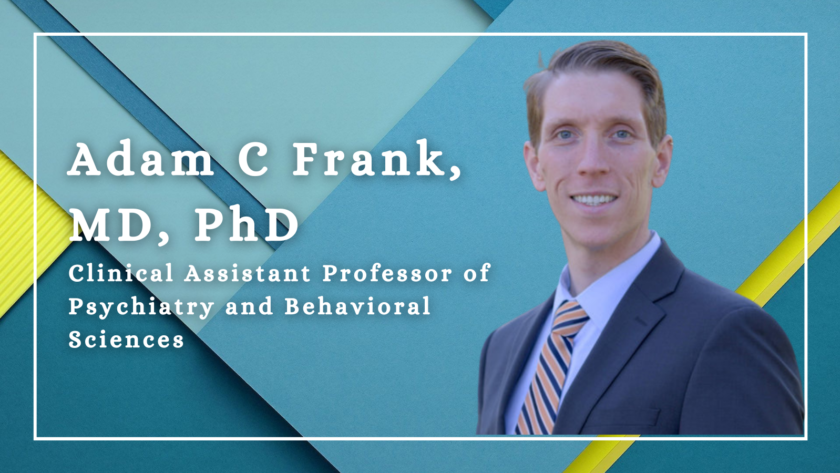An interview with Dr. Adam C. Frank, MD, PhD, KL2 award recipient
A recipient of multiple SC CTSI funding awards, we hear from him about his experiences thus far participating in the KL2 Program, as well as his future plans.

Applications for the new cohort of KL2 scholars are due on September 16, 2022. For more details on how to apply, please visit this page: https://sc-ctsi.org/training-education/mentored-career-development-in-clinical-and-translational-science-program
1. Tell us a little bit about your experience so far in the KL2 program.
I have enjoyed being part of the latest cohort of KL2 scholars so far. All my interactions with my fellow scholars have been engaging and positive. The faculty and staff have gone out of their way to be helpful and supportive. I look forward to participating in the coursework and conferences in the coming months.
2. How did you first learn about the program?
I learned of the CTSI at USC from a colleague involved in translational research. When I began to explore the CTSI website, I came across the KL2 program and thought it would be an excellent opportunity for my clinical and research career.
3. What initially got you interested in starting this program?
I became interested in the KL2 program given its mission to support junior faculty who are pursuing careers in clinical and translational research. As I began exploring the various facets of the program - the certificate in clinical, biomedical, and translation investigations, the career development seminar series, the annual translational science conference -- I recognized that the KL2 would be an ideal mentoring program for me at this stage of my career.
4. Were you influenced by a particular experience that led you to dedicate your research to this area?
As a psychiatrist, I regularly witness the suffering and loss of functionality individuals experience when in the midst of a mental health disorder. Psychiatry as a field is beginning to understand the mechanisms within the body and brain that contribute to these disorders, but more work is needed to improve and personalize treatment. Given my training, experience, and interests, I am well positioned to make significant contributions on this front and am excited to have the potential to implement novel treatments for patients.
5. What about the brain do you find most fascinating?
I continually marvel at the molecular, cellular, and circuit-level complexity of the brain and the staggering computations it performs for each of us throughout our lives. This collection of cells between our ears gives rise to who we are as individuals and how we interact with the world; I find this endlessly fascinating.
6. Who is your biggest inspiration?
I initially became interested in medicine and science while growing up with my grandmother, who lived with my family and suffered from Alzheimer’s disease. I recall feeling surprised and sad that there were no treatments to improve her cognition or alter her disease course. Over the approximately 25 years since that period my research and clinical interests have evolved, but I continue to think back to my grandmother, the sadness I felt at the time, and the wish for continued improvements in medical science; that childhood wish has turned into a drive that continues to propel me forward today.
7. What do you think that others can gain from this program?
The support from staff and faculty within the program is foundational. On top of this, the interactions with co-fellows and others within the rich clinical and translational research sphere at USC make this program unique. It is this combination that has the potential to be of great benefit to others considering the program.
9. What has been the most rewarding part of being a part of the KL2 program?
Beginning to interact with other KL2 scholars and senior faculty and leadership within the Keck School of Medicine has been exciting. I anticipate these relationships that I form with colleagues will be a highly rewarding aspect of the program.
10. What does the KL2 program mean to you and how has it furthered your career?
The KL2 program, for me, is a chance to contribute to the research community at USC while also leveraging this environment to advance my own translational research program. The program has provided me with support and time to launch new research studies. Additionally, the structured mentorship integral to the KL2 program has allowed me to integrate my work with that of established scientists at USC.
11. Who else has been an integral part of your success in this program?
My mentors, Dr. Bradley Peterson and Dr. Shrikanth Narayanan, are ardent supporters of my science and my clinical and research career. I owe much thanks to both for opportunities they have afforded me, even early in the KL2 program. My department chair, Dr. Steven Seigel, has also been enormously supportive of my research program and career goals.



